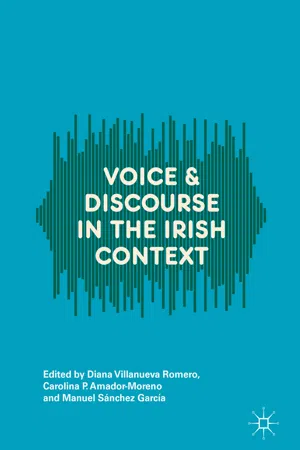
Voice and Discourse in the Irish Context
- English
- ePUB (mobile friendly)
- Available on iOS & Android
Voice and Discourse in the Irish Context
About This Book
This book examines the intersection of culture and language in Ireland and Irish contexts. The editors take an interdisciplinary approach, exploring the ways in which culture, identity and meaning-making are constructed and performed through a variety of voices and discourses. This edited collection analyses the work of well-known Irish authors such as Beckett, Joyce and G. B. Shaw, combining new methodologies with more traditional approaches to the study of literary discourse and style. Over the course of the volume, the contributors also discuss how Irish voices are received in translation, and how marginal voices are portrayed in the Irish mediascape. This dynamic book brings together a multitude of contrasting perspectives, and is sure to appeal to students and scholars of Irish literature, migration studies, discourse analysis, traductology and dialectology.
Frequently asked questions
Information
NEG/AUX Contraction in Eighteenth-Century Irish English Emigrant Letters
Keywords
NEG/AUX contractionNegationIrish EnglishEmigrant lettersCorpus of Irish English Correspondence (CORIECOR)Dania Jovanna Bonness
Table of contents
- Cover
- Front Matter
- Introduction
- Voicing the ‘Knacker’: Analysing the Comedy of the Rubberbandits
- He’s After Getting Up a Load of Wind: A Corpus-Based Exploration of be + after + V-ing Constructions in Spoken and Written Corpora
- ‘I Intend to Try Some Other Part of the Worald’: Evidence of Schwa-Epenthesis in the Historical Letters of Irish Emigrants
- NEG/AUX Contraction in Eighteenth-Century Irish English Emigrant Letters
- A Corpus-Based Approach to Waiting for Godot’s Stage Directions: A Comparison between the French and the English Version
- Samuel Beckett’s Irish Voice in Not I
- Bernard Shaw and the Subtextual Irish Question
- Voices from War, a Privileged Fado
- A Century Apart: Intimacy, Love and Desire from James Joyce to Emma Donoghue
- Foreign Voices and the Troubles: Northern Irish Fiction in French, German and Spanish Translation
- Back Matter